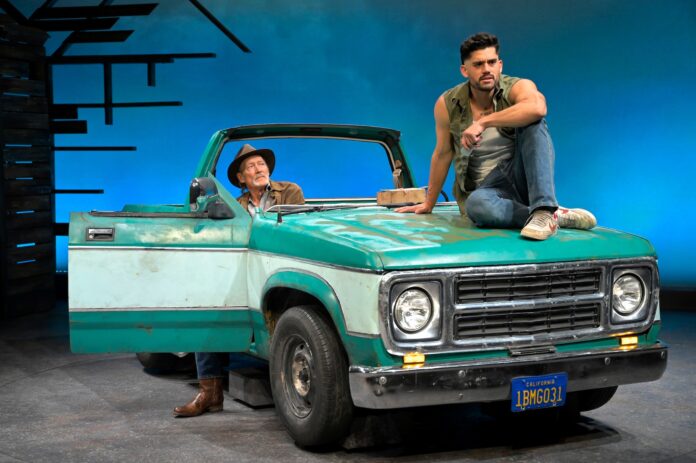Playwright Octavio Solis loves road trips. So when was giving a talk on his adaptation of John Steinbeck’s The Pastures of Heaven at Salinas’ National Steinbeck Center, and he heard the executive director talking about a planned trip from Oklahoma to California along the path of the Joad family in Steinbeck’s The Grapes of Wrath, he says he “shoehorned” his way in.
On the 2013 trip, Solis and the other artists were gathering oral histories from people on the way about how the Dust Bowl had affected their families. Solis wasn’t planning on writing a play from the adventure, but after a conversation with a young man who met them at the Arvin Migrant Camp (known as Weedpatch in Steinbeck’s novel), Solis changed his mind.
Pretty much everyone they talked with held Steinbeck’s classic about tenant farmers leaving Oklahoma in deep disregard, Solis said. They hadn’t read it, but their impression was it portrayed people from Oklahoma and those who worked the land as ignorant hicks.
But the young man at the migrant center, an agricultural worker, had not only read the book—he cited whole passages. And that’s when Solis got the idea for Mother Road, at the Berkeley Repertory Theatre through July 21.
“He said, ‘I am the new Tom Joad, and we are the new Okies,’” Solis said. “That’s what made me go, ‘Yeah, this is my play.’ I didn’t know the story until I started writing it. But I knew my way in.”
Tom Joad is the protagonist of the novel. In Mother Road, his descendant, William Joad, is looking for another Joad to leave his Oklahoma farm to. He finds Mexican American farmworker, Martín Jodes, and they travel along Route 66 from Weedpatch, California to Saliisaw, Oklahoma, in Martín’s green pickup truck, Cesar. Along the way, they bond despite their generational and racial differences.

Solis says he hadn’t read the novel since high school. It made a deep impression on him then, especially the final scene.
“I had never come across anything like that in my life, and it was something that stirred me so deeply and shocked me,” he said. “I mean, I’m a 14, 15-year-old kid, and it’s about a woman suckling an old man who’s starving because she’s got milk and no baby. And it just seemed like such a human act of grace at the very end. That struck me, and it never left me.”
On the Route 66 trip, Solis read The Grapes of Wrath again.
“It was really fascinating, reading this novel late into the night and during the drive, and then looking up and seeing how the terrain around me had either changed dramatically or actually not changed at all,” he said.
“Things still felt like, yeah, this is America during the Depression. We were having horrible recession at the time which translated to a depression in small town America. You could see it—it was writ large. There was a lot of disenchantment, and there was a lot of alienation.”
In the play, a chorus of actors appears around the truck periodically, announcing the mile markers and narrating the journey.
Solis says this was suggested to him by the novel, which in between longer chapters about the Joads had short ones giving a global view of what was going on in the country, such as one about car salesmen who would sell junky cars with bad tires to people who badly needed to get out. This gives you a sense of the larger story, Solis says, comparing it to other sagas.
“This is an epic movement of people, like Moses and his chosen people coming out of Israel, like Aeneus taking his raggedy band of Trojans on 50 ships, looking for a homeland and landing on the shores of Italy, where Rome was founded,” he said. “It’s an epic story of larger-than-life suffering, and larger-than-life issues that deal with not only a personal history, but a larger human history. The chorus for me became that, and they give it a context.”
The play was first performed at the Oregon Shakespeare Company in 2019. For Berkeley Rep, Solis says he “put the play on the treadmill” and it got leaner. He calls director David Mendizábal a big help.
“He would turn and ask me, ‘Do we really need this? Is there a world where we could go from this line to this line? It would only be like three lines honestly, or maybe just one, but it was significant,” Solis said. “I thought, ‘Oh, interesting, cool, he has a real dramaturg’s mind.’ He gets how hard I worked to get the language specific, not only the meaning, but the music.”

In the play, the truck William and Martín travel in becomes, among other things, a diner and a motel room. Solia says the set was built around the truck the same way the cast was built around beloved veteran local actor James Carpenter, who plays William, a dying man with a chip on his shoulder about having stayed and made a success of his Oklahoma farm.
Solis was delighted when Mendizábal and Berkeley Rep artistic director Johanna Pfaelzer suggested Carpenter, who Solis first worked with in 1996.
“I’ve known Jimmy since [Solis’ 1996 play] Santos and Santos. He was the judge back in the inaugural production of Campo Santo. Jim Carpenter and Sean San José [now artistic director of the Magic Theatre] were electric. I love Jimmy. He’s a really, really terrific actor,” Solis said. “He’s from an area not far from my native town of El Paso, Las Cruces, New Mexico, which is just within a half hour, 40-minute drive from El Paso.
“So, he gets me, and he gets my work, and he gets the Southwest the way I get it.”
MOTHER ROAD plays through July 21 at Berkeley Rep. Tickets and more info here








